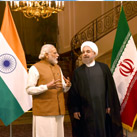Sensitive Nuclear Information: Challenges and Options for Control
This article starts by discussing sensitive nuclear information and how malicious non-state actors could exploit this to facilitate acts of nuclear terror. Our analysis shows that there is a significant information security challenge in this area due to the diversity of sensitive information, the different communities within which it resides and the range of mechanisms by which it could be transferred. We then turn our attention to assessing different steps that could be taken to protect sensitive nuclear information.
- Wyn Q. Bowen , Christopher Hobbs
- March 2014








